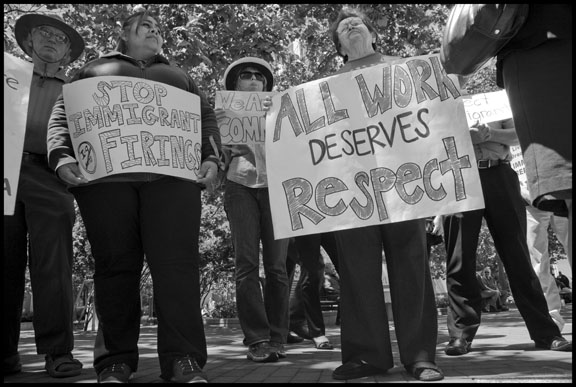by David Bacon
Equal Times
OAKLAND, CA — In an escalating dispute with President Barack Obama, Republican members of the U.S. House of Representatives passed a bill in mid-January, which would cut any funding from the Department of Homeland Security for suspending the deportation of undocumented people. In December the President ordered the department, beginning this spring, to defer the deportation of undocumented immigrants who have children born in the U.S., who are thus U.S. citizens.
A previous Obama order suspended the deportation of young people without documents, brought to the U.S. as children. The Republican bill would rescind both orders.
A new, Republican-dominated Congress took office in January. Congress would have to fund the department by Feb. 27 or it could shut down. President Obama has threatened to veto this bill, and while there were enough Republican votes in the Senate to pass it, there were not enough to override a veto.
The U.S. labor movement has supported deferral programs, and has opposed the mass deportations that now total over 2 million people during the Obama administration – around 400,000 per year. In speaking about his own ancestors, who arrived last century after crossing the Atlantic from Europe, AFL-CIO President Richard Trumka said, “I think about what those boats would look like now. They’d be turned in the other direction, deporting those hopeful workers and separating our families. Because America doesn’t welcome her children now-our broken patchwork of policies turns them away.”
After the Republican majority was elected, Trumka warned its defunding proposal “would further exploitation and force our community members to continue to live and work in fear.” Guillermo Perez, President of the Pittsburgh Labor Council on Latin American Advancement, told Julia Kann, a writer for the magazine Labornotes, that labor’s job was to ensure implementation of Obama’s deferral order. This executive action “will help us in organizing workplaces where there are substantial numbers of undocumented people.” Joe Hansen, president of United Food and Commercial Workers, agreed. “Executive action is not all we need or deserve,” he said. “But it is a step in the right direction.
Obama’s latest executive action, however, caused a lot of controversy among unions and immigrant rights activists, not because of disagreement over the deferral itself, but because of the conditions attached to it. One condition, for instance, will allow high tech employers to bring to the U.S. increased numbers of workers recruited under contract labor programs, and pay them wages substantially below those of U.S. residents. Over 900,000 workers already arrive in the U.S. in these programs every year, which have been criticized because the recruited workers have few labor rights.
Many organizations also criticized the administration’s order because it increases immigration enforcement. U.S. law forbids people to work without legal immigration status, but about 12 million people currently live and work without it. Under Obama’s order, about 4-5 million, at most, may get permission to work. But at the same time the Department of Homeland Security will increase enforcement against those millions of others who will not get it.
Hundreds of workers, for instance, were fired in the middle of an organizing drive at a California supermarket chain, Mi Pueblo. Gerardo Dominguez, organizing director of Local 5 of the United Food and Commercial Workers, called the terminations “an economic disaster for the San Francisco Bay Area.
In addition, the President announced that even greater resources will be spent on the U.S./Mexico border, where hundreds of people die each year trying to cross in the desert. “More enforcement here will mean even more people will die trying to cross, and greater violations of civil and human rights in our border communities,” according to Isabel Garcia, director of the Coalicion de Derechos Humanos, an immigrant rights organization in Tucson, Arizona, with a long history of cooperation with unions.
President Obama also announced he will expand the number of privately run prisons for immigrants, and the number of people held in them. One such center, the South Texas Family Residential Center, has already been built in Texas to hold over 2400 children and family members from Central America.
According to many labor and immigrant rights groups, however, migrants from Central America, Mexico and elsewhere have been driven into migration by free trade agreements and other economic policies pursued by the U.S. government. Yet the Obama administration is currently asking Congress to give it a “fast track” process for approving the Trans Pacific Partnership, a free trade agreement involving 12 countries around the Pacific Rim.
The Obama executive order will not change U.S. law — only the Congress can pass laws. It can only change the way existing law is enforced. The possibility exists, therefore, that an incoming administration elected in 2016 could reverse the order, deporting those who have come forward to claim a deferred status. Note: This article was cut for lack of space. For a complete article, visit: http://www.equaltimes.org/the-us-immigration-battle?lang=en#.VZcSjaZvPhW



